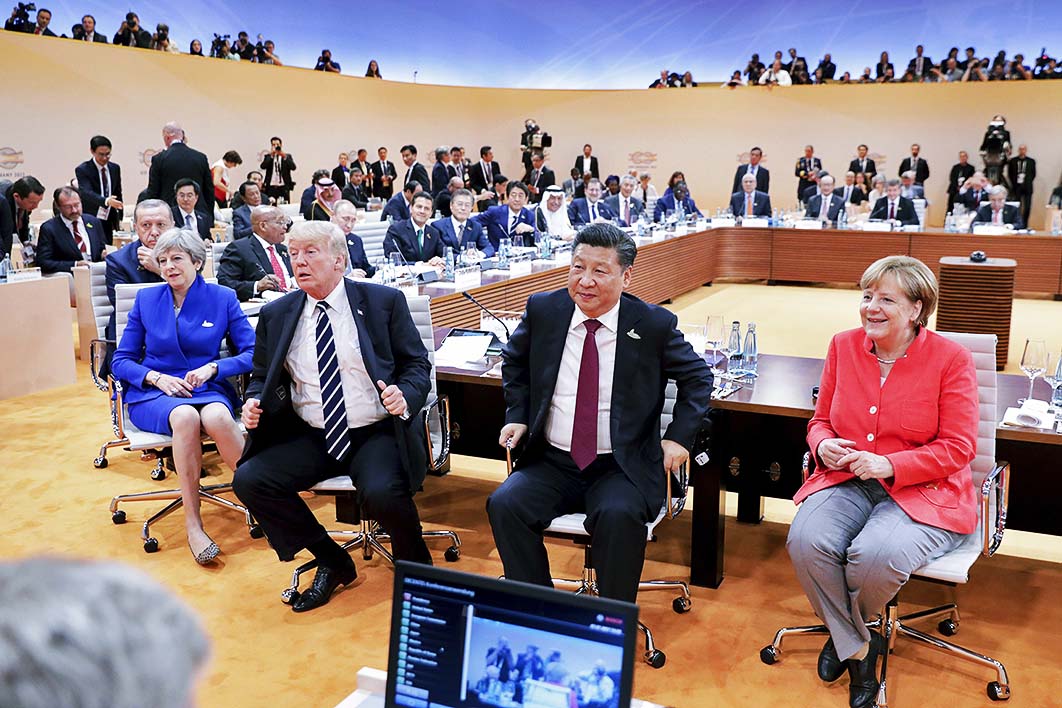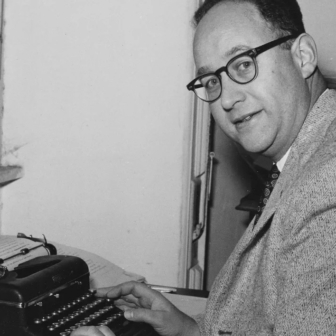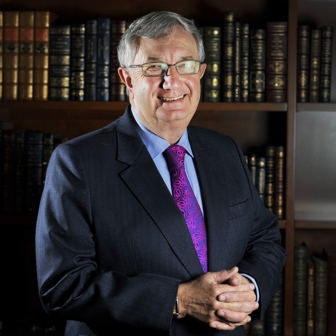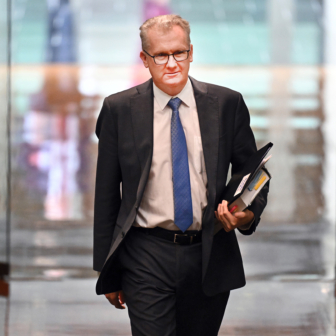“All under heaven is great chaos.” So observed Mao Zedong, with evident satisfaction, when the West was wracked by social upheavals in 1968.
Half a century on, and three decades beyond Francis Fukuyama’s “end of history,” Western democracy seems to have come to another crossroads. The psychodrama that is the Trump administration grips our attention; Britain’s messy divorce from Europe continues along its uncertain path; upstart populists threaten the establishment across the globe, claiming to speak for a forgotten people cast aside by the diktats of modern liberalism.
Politics may offer an imperfect reflection of society, but there are unquestionably fundamental forces at play. Nearly ten years after the global financial crisis, inequality has persisted, if not deepened. Refugee populations continue to grow, straining our capacity to respond, or even to hold them at bay. Automation threatens the very nature of our economies, and with it the future of work. The climate continues to warm. The health of Western democracy has come into question, and with it the liberal philosophies that underpin our way of life.
Financial Times chief US columnist Edward Luce attempts to interpret all this in his concise but broad-ranging new book, The Retreat of Western Liberalism. Western democracies, he argues, are facing an existential crisis. The Brexit referendum and the Trump election are obvious indicators, but they reflect a broader trend. Imitators across Europe might have failed to match these successes, but that is almost beside the point: as Luce persuasively argues, the fact that anti-establishment politicians who would have been nonentities just ten years ago are capable of running a healthy second in major democracies is sign enough that times have changed.
More importantly, this new demagoguery is symptomatic of deeper structural tensions, and represents an entirely rational backlash against establishment liberalism. Indeed, in one of his book’s finer passages, Luce argues against characterising those who vote in support of populist causes as anti-democratic, and offers a stinging and well-deserved critique of those who do.
Compounding these challenges are evolving global conditions that have brought the presumed dominance of liberalism into question. While recent US administrations have been wilfully soiling liberalism’s claims to global legitimacy through ill-planned and ill-fated Middle Eastern adventures, the centre of global economic power has been steadily shifting towards a decidedly illiberal but equally ill-understood China, and automation threatens to amplify the impact this is having on Western societies.
The capacity of our way of life and its political systems to survive this global shift in power is the question Luce says he is seeking to answer, though he also explores more fundamental questions about the nature of liberalism and liberal democracies. The crisis of liberalism, he argues, reflects a complacency and ignorance of history on the part of liberals, politicians of most stripes, and voters themselves. Collectively, we have forgotten what made Western democracies a success in the first place, and with the end of easy economic growth – a historical oddity born of unique circumstances – we have perhaps lost the capacity to repeat it. In its place, an arrogance towards the have-nots of society has set in, dividing our societies at their moment of greatest vulnerability.
If there is one lesson we should learn from the history of liberalism, it is that sharing economic spoils does not come easily. Indeed, as Luce points out, liberalism’s pretensions to universality have rarely been reflected in the actual functioning of societies. Though he draws this thread right back to the “year zero” of Magna Carta – a short-lived document that enshrined the privileges of the aristocracy and restricted the rights of women and Jewish people – the modern history of liberalism is sufficient to demonstrate the point.
The great democratisations of the eighteenth and nineteenth centuries were inherently restrictive, with women, the unpropertied, Indigenous peoples and the enslaved excluded by design. Where the franchise expanded, it came largely in response to a crisis. From the nascent organised labour movements of the nineteenth century, through the social demands of the world wars, the women’s suffrage movement and the postwar civil rights struggles, liberties were, as Aldous Huxley put it, taken rather than given.
These concessions reflect an innate strength of liberalism: the flexibility and capacity for reform that saw it out-compete and outlast its great twentieth-century rivals, fascism and Soviet communism. But it also means that the era of true liberal democracy has been far briefer than we might think. In most Western democracies the franchise has only been truly universal for a century at most, and in many, including Australia’s, for far less. That the Swiss, aspirants to the title of the world’s oldest modern democracy, only guaranteed women the vote in 1970 says it all.
This flexibility is a function of the liberal state’s reluctance to exert force against its own people. And so, when desperate times have called for desperate measures, the response has been to spread the benefits of the status quo more widely so that the stake in defending it is also shared. But the fact that this has generally come in response to crisis reflects the tension at the heart of liberalism and the liberal society.
Regardless of their origins, liberal societies have been a marked success. They have produced the greatest material prosperity enjoyed anywhere at any time (leaving aside unaccounted-for externalities). Despite an increasing preoccupation with security within the state and society, liberal principles do still remain the best defence against the arbitrary abuse of power, and liberalism the societal model least likely to rely on the logic of secret police and concentration camps.
The legitimacy of liberal societies rests on their capacity to enhance the lives of their people on a broader level. Where this capacity is diminished, consciously or otherwise, so goes that strength. Indeed, the lesson we can draw from the past century is that while individual freedoms may be a necessary precondition for a healthy society, they are not a sufficient one. As Lucius D. Clay, US military governor of postwar West Germany, once wrote, there was little choice between becoming a communist on 1500 calories and a democrat on 1000.
Luce draws out much of this. He acknowledges the episodes during which privileges (the franchise, the welfare state, or the broader fruits of economic growth) were extended, and recognises the relative health of those states that established and have retained the equalising structures of social democracy. He perceptively highlights the fundamental reality that has granted liberal societies this capacity, suggesting that while “we are taught to think our democracies are held together by values” – a myth fuelled by our faith in history – “liberal democracy’s strongest glue is economic growth.”
Where Luce’s argument about liberalism runs into trouble is in his failure to satisfactorily explain why privileges were extended to growing numbers of citizens, and why our societies no longer engage in that process to the same degree. This is the fundamental question posed by the problems he discusses: liberalism has shown a capacity to reform in the past, so why not lately, and why not in response to the present crisis?
Luce’s emphasis on the perils of the automation of our economies is warranted. He also makes a persuasive argument that these will affect China and India just as much as they do Western democracies, though he doesn’t fully explore the underlying forces. Any society is ultimately dependent for its legitimacy on its capacity to make the lives of its members better – or, at least, not worse. This is the true lesson of the age of easy growth, and of its end.
While Luce’s observations are often perceptive, the most cogent and coherent sections of The Retreat of Western Liberalism are those in which he discusses other observers’ ideas. Between these diversions, he tends to skip across the challenges facing our democracies without demonstrating underlying connections, adding articulations of his contentions seemingly as afterthoughts. This rapid-fire argument becomes disconnected, at times contradictory and ultimately half-formed.
And when he moves into contemporary politics and the possibilities for the future, the analytical power of the book softens markedly. While the myopic Clinton campaign is an apposite example of the elite arrogance that has fostered and then ignored anti-establishment revolts, Luce’s explanations here, too, fall short. Framing “identity politics” and immigration as fundamental problems, he fails to explore the history of either.
Identity politics has its root in those groups who remained excluded from society even at what might be called the time of peak equality for the broader mass of people. The fact that sections of liberal societies have needed to engage in collective action to formally attain the rights that liberalism theoretically already guaranteed to all individuals highlights the nature of the system. Curiously, Luce doesn’t look at how that history can help us understand the white working-class anxiety and millennial resignation that have fed the present climate.
Like Australia, the United States is a settler society, a nation built on the back of successive waves of mass migration. That a stable society could be fashioned in such circumstances demonstrates liberalism’s capacity to reconcile divided societies when circumstances demand – and permit. That identity politics and immigration are now points of contention around which populist movements rally, ironically often through a competing identity politics of their own, says little about the innate nature of either impulse. Rather, Luce again poses the question of what has changed, and why, but then leaves it unanswered.
Not surprisingly, Donald Trump figures largely in the second half of the book. Luce clearly demonstrates Trump’s inability to resolve these tensions (and, indeed, the likelihood he will heighten them) but offers little on the ends we might pursue instead. As he argues, Trump is merely a symptom of a far deeper malaise, and as likely to be replaced by someone worse as someone better. Yet, in framing the president as a function of a disenchanted, reality television culture, Luce abandons his previous arguments, and to his own disservice. Neoliberalism offers no shortage of distraction and, if anything, Trump is living proof of the inherent limitations of bread and circuses. Without a deeper and more systematic analysis of his causes, the prescribed treatments are equally limited.
The challenges Luce outlines are unquestionably real. Deepening inequality, global power shifts, environmental degradation, the automation of work, an elite unwilling to take responsibility – all these threaten the foundations of Western democracies. How, or even if, we can sustain our way of life is one of the pressing questions of our time, and there are unquestionably important books to be written on the topic. This, an intriguing but unsatisfying read, is not quite one of them. •




